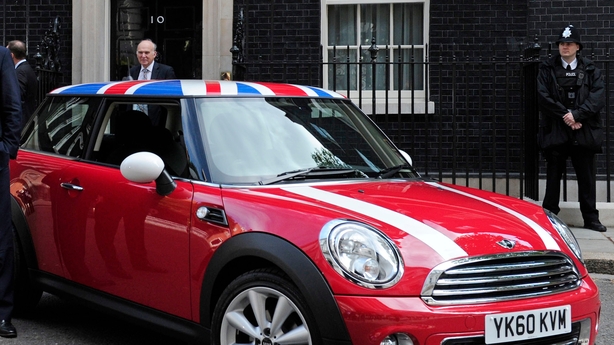BMW has beefed up its logistics to include air freight options as part of contingency plans to prepare itself for Britain's exit from the European Union, CEO Harald Krueger said today.
"We have also taken measures to secure supply routes by air," Krueger said in response to a question about its contingency plans to help ensure a smooth supply of components while politicians haggle over Brexit terms.
BMW hopes that Britain will remain part of the common market, but the Munich-based carmaker is making plans to prepare for a possible "hard Brexit", Krueger said on a conference call to discuss the company's third-quarter earnings.

BMW currently builds most of its Mini vehicles at a plant in Oxford, but relies heavily on components imported from BMW's German plants.
Oxford made about 60% of the 378,486 Minis produced by BMW Group last year.
Earlier, the German carmaker said it will deepen cost cuts after higher development expenses contributed to a 27% drop in third-quarter operating profit.
The figures fell short of analyst expectations as currency effects also took a toll.
Investments to develop electric and self-driving cars, as well as spending to boost production of new X5, X7 and 8-series luxury models weighed on earnings when tariffs between China and the US and a price war in Europe were already eroding margins.
Capital expenditure will rise again in the fourth quarter, BMW said, due to the start of production for a new version of its flagship model, the BMW 3 series.
BMW's earnings before interest and taxes (EBIT) of €1.75 billion came in below the €1.8 billion forecast in a Reuters poll as higher raw material prices, currency effects, and €679m worth of provisions for vehicle recalls had an impact.
The company said that despite a slight rise in deliveries of luxury cars, its operating return on sales for the automotive division narrowed to 4.4% from 8.6% a year earlier, well below its targeted range of 8-10%.
BMW had warned in September that its pretax profit would fall this year, against earlier expectations for a flat outcome, and cut its profit margin guidance for cars, blaming intense price competition, trade and currency headwinds.
"Compared with 2017, additional upfront expenditure of around €1 billion for the mobility of the future and a high three-digit million euro negative impact from exchange-rate and raw materials price developments had been factored into expected earnings for the year," BMW said.
While BMW had fewer problems than rivals Volkswagen and Daimler in selling cars that conform to the new Worldwide Harmonised Light Vehicle Test standards (WLTP), the onset of the rules has led to cut-throat competition, supply distortions and heavy discounting.
Separately, BMW said it will purchase specific raw materials such as cobalt, and then make them available to battery cell suppliers as a way to secure a supply of electric car batteries.
BMW is establishing a technology consortium with Swedish battery manufacturer Northvolt and Belgium's Umicore to develop a value chain for battery cells in Europe, including development, production and ultimately recycling.

